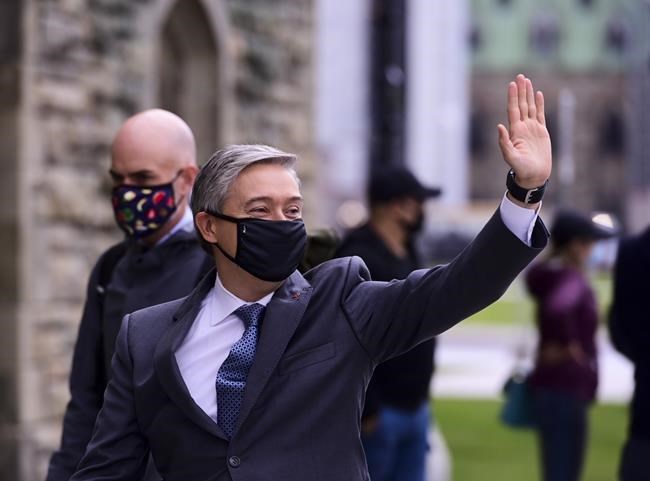OTTAWA — Foreign Affairs Minister François-Philippe Champagne said Friday he deplores a statement by Azerbaijan's president that a military solution is the only way to solve his country’s current crisis with Armenia.
The renewed fighting in the decades-old conflict between Azerbaijan and Armenia in the Nagorno-Karabakh region entered its ninth day Friday and will be a key focus of Champagne’s second overseas trip in less than two months.
Friday's announcement of a four-country European tour appeared to underscore Champagne's commitment to project Canada as a defender human rights while forging alliances with trusted, longtime allies.
Along with his British counterpart, Dominic Raab, Champagne has called for a ceasefire in the conflict, saying a negotiated settlement is the only way to end the heavy shelling by warplanes, drones and artillery that has seen both sides trade allegations of indiscriminately attacking civilians.
On Friday, Azerbaijani President Ilham Aliyev said in an address to his country that the conflict is now being settled by military means and political means will have to follow.
"I would deplore anyone who thinks that the use of force is the best way to resolve the current conflict. Quite the opposite," Champagne said Friday in a conference call from Ottawa.
"Conflicts are resolved around the negotiating table, not on the battlefield."
Champagne also spoke Friday to his Turkish counterpart, Mevlut Cavusoglu, days after Canada suspended military exports to the NATO ally. Champagne said he reiterated the public allegations that a targeting sensor made by southern Ontario company is being used in Azerbaijani fighter jets to pummel Armenian targets.
Champagne has suspended export permits to Turkey, pending the outcome of an investigation into whether the Canadian technology is being used in the skies above Nagorno-Karabakh.
Turkey is an ally of Azerbaijan, and denies sending its warplanes to the conflict. Champagne would not say whether he learned any more about any potential support or military role Turkey might be playing in the fighting in the conversation with Cavusoglu.
"My key message was stay out of the conflict," Champagne said.
"I certainly urged my Turkish counterpart to play a role in de-escalation, staying out of the conflict, and encouraging Azerbaijan to come back to the negotiating table because we both agreed that there's no military solution to this conflict."
Champagne departs Sunday on a trip that will take him to Greece, Austria, Belgium and Lithuania. He will meet the exiled opposition leader of Belarus as well as hold talks on the fighting between Azerbaijan and Armenia.
He will cap the trip with a stop in Vilnius, where he will meet with Belarusian opposition leader Svetlana Tikhanovskaya, where she is seeking refuge after what Champagne has said was a fraudulent election victory by the authoritarian leader of Belarus, Alexander Lukashenko, this past summer.
Bessma Momani, an international affairs expert at the University of Waterloo, said there's only so much diplomacy foreign ministers can do behind a computer screen, so Champagne's desire to travel is understandable.
Momani said it is also smart for Canada to find allies to work on issues in tandem, whether it is the renewed violence between Azerbaijan and Armenia, or its near two-year dispute with China. That has included the imprisonment of two Canadian men in what is viewed as clear retaliation for Canada’s arrest of a leading Chinese high-tech executive on an American extradition warrant.
In Vienna, Champagne will meet with representatives of the secretary-general of the Organization for Security and Co-operation in Europe, which is calling for peaceful negotiations between Azerbaijan and Armenia.
Champagne will likely find it difficult to make meaningful progress on that issue "unless they can get regional actors from Turkey, Russia, Iran, and Israel, who are all operating in this conflict, to the table," said Momani.
Champagne also joined Raab recently to impose sanctions that directly target Lukashenko, his family and his ministers, after their violent crackdown against massive protests in Belarus following Tikhanovskaya's defeat in the August election.
Tikhanovskaya, 37, is a political neophyte who challenged Lukashenko after her husband, who planned to challenge the presidency, was jailed. She is a former English teacher who managed to connect with Belarusians fed up with Lukashenko’s authoritarian rule, and a declining economy in the face of the pandemic.
Momani said Champagne's meeting with her will highlight the sanctions he imposed on Belarus with Britain as Lukashenko digs in, hoping the world will abandon "the nascent democratic social movement" that is opposing him.
"While Tikhanovskaya is just a figurehead, meeting with her is an opportunity for Canada to demonstrate some support to the embattled Belarusian opposition."
In Brussels, Champagne's meetings will include face-to-face talks with his European Union counterpart, Josep Borrell and NATO Secretary-General Jens Stoltenberg.
In Athens, Champagne will meet with more NATO allies: Greek Prime Minister Kyriakos Mitsotakis and his foreign minister, Nikos Dendias.
This report by The Canadian Press was first published Oct. 9, 2020.
Mike Blanchfield, The Canadian Press

